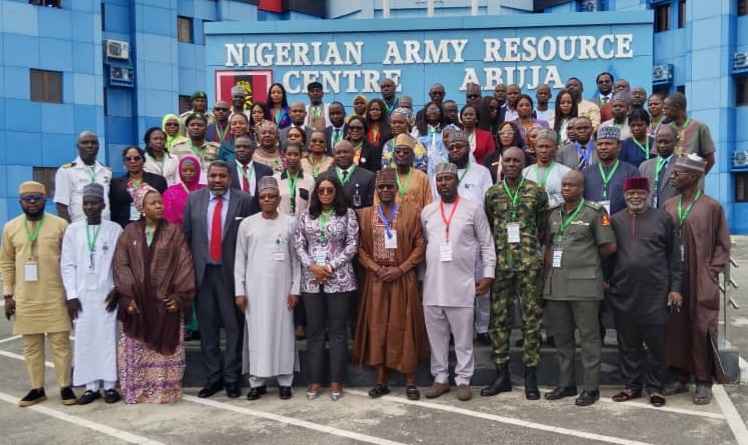Editor’s Note: In this article, Maureen Okpe sheds light on the transformative initiative by the NIPSS and PBDC to equip Nigerian leaders with strategic foresight and anticipatory governance skills. As the nation battles complex security threats, economic uncertainty, and rising social tensions, the senior leadership course marks a significant shift from reactionary measures to proactive, long-term planning. The article underscores the urgent need for a coordinated, future-oriented leadership culture that prioritises resilience, systems thinking, and collective action by integrating insights from prioritised experts, senior officials, and development partners.
“We Must Anticipate, Not Just React” – NIPSS Sets the Tone
As Nigeria grapples with the convergence of economic hardship, insecurity, social unrest, and climate-related disasters, the National Institute for Policy and Strategic Studies (NIPSS), in collaboration with the Peace Building Development Consult (PBDC), has championed a transformative leadership shift from reactive crisis response to proactive strategic anticipation.
This was the focus of a three-day high-level Leadership Course on Strategic Anticipation and Crisis Management, recently held at the Nigerian Army Resource Centre, Abuja. The intensive training brought together over 78 participants from the federal and state civil services, security agencies, development institutions, and private sector professionals to explore how foresight-driven governance can build national resilience.
Declaring the training open, Dr. Garba Malumfashi, Senior Fellow at NIPSS, laid out the institute’s mission, noting, “Policymakers need foresight more than ever before. We must manage and anticipate crises in this volatile, uncertain, complex, and ambiguous (VUCA) world.”
He emphasised that the program aligns with NIPSS’s mandate under the National Institute Act 1979, fostering policy innovation and strategic thinking.
“This course is about building capacity not just for today’s problems, but for tomorrow’s uncertainties,” he said.
In Nigeria’s dynamic and multidimensional threat environment, the call for a paradigm shift from reactive crisis management to anticipatory governance is growing louder. Strategic foresight thinking is at the heart of this shift—a forward-looking, participatory process that equips decision-makers to navigate uncertainty, anticipate risks, and shape resilient futures.
Foresight Over Firefighting: Case for Long-Term Thinking
One of the most transformative sessions at the Leadership Course was delivered by Prof. Anthony Kila, Professor of Strategy and Development and Director at the Commonwealth Institute for Advanced and Professional Studies. In his thought-provoking lecture, “Strategic Foresight and Scenario Planning: Building Resilience in a Rapidly Changing World,” Kila challenged leaders to step away from short-term crisis response and embrace long-term strategic thinking. According to him, “strategic planning is not about predicting the future—it’s about preparing for multiple futures.“
He urged Nigerian leaders to shift from short-term crisis reactions to long-term strategic frameworks using tools such as environmental scanning, scenario development, trend analysis, and backcasting. “Strategic foresight helps anticipate disruptions, align policies with emerging risks, and build adaptive capacity. Those who adopt foresight win,” he added.
Harping on the need for “understanding the turbulent terrain, ” Kila began by vividly painting a rapidly changing world, defined by global complexity, technological disruptions, climate change, demographic shifts, and economic volatility. He argued that traditional governance approaches are insufficient and dangerous in such a landscape. “The world is not waiting for Nigeria to catch up,” he warned. We must move from reacting to preparing—only then can we lead in uncertainty.”
He further shed more light on “resilience: beyond bouncing back”, where he defined resilience not as mere recovery, but as the ability to adapt, stay focused under pressure, and lead through volatility. He highlighted seven pillars of resilience building for leaders: self-analysis (personal and institutional), clear vision and purpose, strategic decision-making, effective communication, building strategic networks, cultivating adaptive organisational culture, and performance-driven thinking. “Resilience is not about enduring the storm—it’s about learning to dance in the rain,” he quipped, drawing nods of agreement from participants.
On “what is strategic foresight—and why it matters”, Kila stressed that strategic foresight is the structured, systematic exploration of possible futures to guide today’s decisions. It helps leaders anticipate disruption, align policies with emerging risks, and design flexible responses. “Foresight is not about predicting the future,” he clarified, “but about preparing for many possible futures. Those who adopt strategic foresight win.”
He emphasised that foresight must move from theory into practice and process. To do this, leaders should: regularly scan for trends and emerging risks, engage in strategic dialogues that challenge assumptions, and develop contingency plans that can adapt to shifting realities.
On “scenario planning and thinking in possibilities”, the policy analyst introduced scenario planning as a critical technique for navigating complexity. It involves crafting and analysing multiple plausible futures based on key drivers and uncertainties. Using PESTEL and SWOT analysis, leaders can map out diverse possibilities, assess risks, and make strategic choices with more confidence. “Scenario planning gives leaders a rehearsal for the future. If you only plan for one version of tomorrow, you’ll likely be blindsided,” he noted.
He outlined a simple yet powerful process for identifying the focal issue, defining the scope (e.g., 10-year outlook for a sector), and determining key drivers using environmental scans. Others are: select two key uncertainties to build a scenario matrix, develop narratives for each scenario, and then use findings to shape strategy, adapt plans, and guide policy.
Prof. Kila, highlighting the “application across sectors”, demonstrated how strategic foresight and scenario planning are relevant across different levels of governance and businesses. He said governments could focus on national resilience strategies, legislative foresight, and crisis preparedness. For policymakers, this is about inclusive, adaptive policy cycles that evolve with real-time feedback; while for corporate leaders, this emphasises strategic risk mapping, innovation planning, and future positioning.
He also listed some “practical tips for implementation.” He concluded with five actionable steps: understand what foresight and scenario planning entail, and be clear about your objectives—why do you need it? Others include building or designating a foresight team/unit, integrating foresight into strategic planning processes, and starting with simple horizon scanning exercises.
Some key takeaways from this session are: resilience is more than recovery—it’s readiness; strategic foresight enables smarter, adaptive governance; and the future is not to be predicted but to be prepared for. According to Kila, “strategic foresight is not a luxury. It is a necessity.”
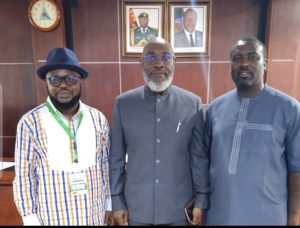
Bridging the Gap Between Policy and Practice
At the heart of effective leadership lies the ability to anticipate. As Nigeria continues to face a mosaic of socio-economic, environmental, and political uncertainties, the question is no longer whether policies should be forward-looking but how they can be designed to withstand disruption. In his illuminating presentation, Dr. Garba Malumfashi, Senior Fellow at the National Institute for Policy and Strategic Studies (NIPSS), brought these questions into sharp focus, offering theoretical clarity and practical direction.
In this follow-up lecture, Malumfashi stressed the intersection between law and policy: “A policy may inspire a law or derive from it, but both must align. Strategic anticipation tools like early warning systems and stakeholder engagement help strengthen resilience.”
He argued that strategic foresight fosters better governance and improves public trust, noting that “good policies are expressions of good governance.”
Speaking at the Nigerian Army Resource Centre in Abuja, Malumfashi emphasised that strategic anticipation—not just reaction—must guide modern governance. “Good policies,” he remarked, “are the clearest expressions of good governance.” The actual test of leadership is its ability to shape—not just survive—the future.
In defining policy as “a deliberate system of guidelines to guide decisions and achieve rational outcomes,” he underscored the fundamental relationship between public policy and governance. A well-crafted policy, he argued, is proactive, inclusive, and adaptable. But more importantly, it is strategically anticipated—crafted with an informed awareness of long-term outcomes, evolving risks, and emerging opportunities.
Strategic anticipation, as presented, is a future-oriented approach to policy-making that incorporates foresight, early warning systems, and scenario planning. It does not predict the future—it prepares for it. Through tools like horizon scanning, Delphi studies, and scenario simulation, policymakers can move beyond reactive governance to a posture of resilience and preparedness.
One of the core research methodologies Dr. Malumfashi explored is horizon scanning—a technique used to detect weak signals of change before they crystallise into major disruptions. Unlike traditional environmental scanning, which focuses on immediate factors, horizon scanning casts a wider and longer lens. It analyses technological, social, economic, and ecological shifts—from AI to demographic transitions—and guides leaders in identifying “what’s next” before it arrives.
In Nigeria, horizon scanning is critical for energy transition, food security, climate adaptation, and youth employment. Malumfashi noted, “Policy must be outward-looking—sensitive to national, regional, and global dynamics—to effectively anticipate the interconnected nature of emerging threats and opportunities.”
To complement data-driven analysis, Malumfashi advocated the Delphi method, a structured approach to harnessing expert opinion through iterative, anonymous rounds of consultation. Delphi studies enable consensus-building without distortion of dominant voices, which is particularly effective in areas with limited data or uncertain conditions. “In matters where statistical clarity is lacking, human judgment, aggregated thoughtfully, provides a clearer map forward,” he explained.
The Delphi approach was highlighted as especially relevant in Nigeria’s fluid policy landscape, where technological disruption, regulatory gaps, and rapidly shifting public expectations demand one expert voice and a chorus of informed perspectives.
One of Nigeria’s most promising applications of strategic anticipation is the Vision 2050 Plan—an ambitious, multi-decade blueprint for national development. Dr. Malumfashi noted that embedding foresight methodologies into the implementation and monitoring phases of Vision 2050 could make the difference between a visionary document and a transformative national agenda. Strategic anticipation can ensure the plan remains resilient against economic volatility, climate uncertainty, and regional instability.
Other critical areas include climate resilience, AfCFTA-aligned trade policy, and disaster preparedness—all of which require long-term thinking and the agility to adapt as conditions evolve.
Malumfashi called for closer collaboration between government institutions like NIPSS and independent think tanks such as PBDC to institutionalise this forward-looking approach. He recommended embedding foresight into national policy frameworks, enhancing inter-agency coordination, and building institutional capacity for anticipatory governance. Equally vital, he emphasised, is ensuring broad stakeholder engagement—from vulnerable populations to technical experts—throughout the policy cycle.
According to Malumfashi, policy-making must no longer be a closed-door exercise. In a world defined by volatility, he said, the best policies are those shaped by many voices and strengthened by a clear view of the road ahead. “Don’t wait for the government. You are the government,” he concluded.
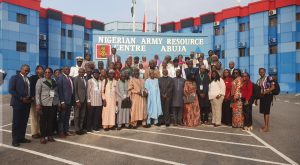
Crisis is Rarely a Surprise: The Case for Preparedness
Mr. Kayode Bolaji, Executive Director of Peace Building Development Consult (PBDC), focused on synthesising the core ideas around human security, crisis resilience, and the role of risk information into an engaging narrative fit for a publication. He stressed that it can serve as a mid-section or lead-in to deeper case studies like Bhopal or COVID-19.
In “Human Security and the Information Lifeline in Times of Crisis”, Bolaji offered a sobering reflection: “Crises rarely arrive like bolts from the blue. They are often the result of ignored warnings, failed controls, and poor preparation.”
He advocated for risk-informed governance and community-based early warning systems.
“It’s not enough to understand risks; we must communicate them effectively. What you do with foresight could save lives.”
In an era marked by climate extremes, pandemics, and economic fragility, Bolaji said that human security has emerged as an essential lens for crisis resilience. According to him, it is no longer sufficient to consider security through the narrow prism of national defence or law enforcement. Today, genuine security must include people’s ability to live free from fear, want, and dignity—even amid the most turbulent disruptions.
The development expert emphasises the protection and empowerment of individuals, especially the most vulnerable, using the framework of human security popularised by the United Nations in the early 1990s. He recognises that chronic threats like poverty and hunger are just as destabilising as acute shocks like hurricanes or industrial disasters. Crucially, he opined, it is people-centred, universal, interdependent, and focused on prevention. In the face of crisis, these principles are not abstract ideals but strategic imperatives.
One vital, and often underestimated, pillar of this security is access to timely, trusted, and relevant risk information. From a rapidly spreading virus to an incoming cyclone, the ability of people to make informed decisions can mean the difference between resilience and ruin. When people are well-informed, their risk perception sharpens, their anxiety is reduced, and their capacity to act is significantly enhanced. As Bolaji notes, “Properly informed individuals gain freedom from fear and, in many cases, better access to resources—freedom from want.”
Bolaji said that the COVID-19 pandemic starkly illustrated this point. It was a health emergency and a human security crisis that exacerbated existing inequalities. Marginalised groups—elderly people, informal workers, and persons with disabilities—suffered disproportionately due to inadequate access to reliable risk communication. In the fog of uncertainty, misinformation spread as fast as the virus. Where governments and institutions communicated clearly and consistently, trust was preserved, and public cooperation followed. Where they failed, confusion and fear reigned.
Similarly, the human security advocate recalled that when Hurricane Maria tore through the Caribbean in 2017, it exposed physical vulnerabilities and systemic gaps in risk communication, emergency planning, and post-disaster recovery. The devastation it left in its wake became a stark reminder that disaster risk is deeply linked to the level of human development—and that preparedness is not a luxury but a necessity.
Risk information must be treated as a lifeline, not a luxury. However, it is not only about issuing alerts or publishing reports. It is about understanding how people seek information, who they trust, what barriers they face, and why certain messages resonate more than others. As highlighted in Bolaji’s research, scenario-based training and community-engaged simulations are vital tools that help bridge this gap, shaping preparedness not from the top down, but from the ground up.
As the world braces for more complex crises—climate shocks, technological disruptions, economic collapses—it becomes clear that a resilient society is an informed society. Human security depends not just on policies, but on participation. And participation hinges on knowledge.
Information, then, is not just power. It is protection. It is dignity. It is survival. “If you see something and say nothing, you are part of the problem,” Bolaji urged.
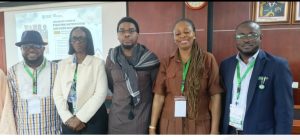
Security Beyond Guns: A Systems Perspective
Dr. Kabir Adamu, CEO of Beacon Consult Ltd, made a compelling presentation titled “Foresight Thinking in Defence and Security Management”, calling for embedding foresight thinking into Nigeria’s defence and security architecture. Seeing it as a strategic imperative, Adamu called for a redefinition of national security: “security is no longer just about guns and borders. It now includes climate change, pandemics, trade conflict, and migration.”
He argued that Nigeria can no longer afford to rely solely on traditional planning approaches that are linear and backwards-looking, in a world increasingly defined by VUCA (Volatility, Uncertainty, Complexity, Ambiguity) and BANI (Brittle, Anxious, Non-linear, Incomprehensible) realities—where geopolitical upheavals, cyber threats, climate shocks, and disinformation campaigns converge—foresight thinking emerges as a vital tool for national survival and progress.
He emphasised the importance of interdisciplinary security planning in a VUCA/BANI world, noting that “strategic foresight allows us to move from reacting to shaping responses. Tools like environmental scanning and scenario modelling are indispensable.”
“Foresight is not prediction; it’s about preparing for multiple plausible futures,” Adamu stressed. “It enables defence and security institutions to move beyond tactical reaction to strategic anticipation.”
According to the security expert, foresight thinking empowers institutions to explore “what-if” scenarios, detect weak signals of emerging threats, and devise robust adaptive strategies across various possible futures. It marks a significant shift in mindset, moving from defensive postures to offensive preparedness.
In Nigeria’s context, where insecurity manifests in forms as diverse as terrorism in the Northeast, banditry in the Northwest, separatist agitations in the Southeast, and urban crime in the Southwest, Adamu argues that the urgency to adopt anticipatory frameworks is evident. Traditional threat assessments are often reactive, addressing symptoms rather than root causes. Strategic foresight breaks this cycle by identifying interconnected risks before they escalate into crises.
By integrating methodologies such as horizon scanning, scenario planning, backcasting, and strategic simulations, foresight becomes a practical instrument for transforming early warning into early action. For instance, anticipating how climate-induced migration or AI-driven cyber warfare could impact national stability allows policymakers to pre-position resources and build flexible response mechanisms.
Furthermore, Adamu introduced Enterprise Security Risk Management (ESRM) as a critical operational tool that aligns perfectly with foresight thinking. ESRM promotes a lifecycle approach—from identifying and assessing risks, to developing adaptive mitigation plans and continuous monitoring. When combined with foresight, ESRM evolves from a technical checklist into a dynamic decision-support framework.
“Foresight strengthens ESRM by embedding environmental scanning, scenario analysis, and anticipatory adaptation directly into each stage of the risk cycle,” he noted.
Despite its potential, Adamu said, Nigeria’s current security architecture faces critical gaps: the absence of foresight units in defence agencies, fragmented intelligence frameworks, and short-term planning cycles that undermine long-term stability. However, these gaps also present opportunities.
To this end, the Beacon Consult boss called for: institutionalising foresight functions across all security and defence agencies; and building capacity for future-oriented analysis through cross-sector training. He also called for leveraging technology, including AI (Artificial Intelligence) and big data analytics, to enhance early warning and intelligence fusion. Engaging inclusive leadership, especially youth and underrepresented voices, to co-create strategic visions for national security.
As Nigeria strives to align its national development goals with the 2030 Agenda, he concluded that integrating foresight into defence and security planning is no longer optional—it is imperative. The strategic advantage lies in responding to today’s threats and shaping the trajectory of tomorrow’s security environment.
By adopting foresight as a core competency and institutional mindset, Nigeria can future-proof its defence systems, break the cycle of reactive governance, and build a resilient, inclusive, and anticipatory national security architecture fit for the 21st century.
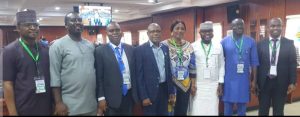
Rural Governance, the Frontline of Insecurity and Call to Action
Chris Ngwodo, Director-General of the Office for Strategic Preparedness and Resilience, highlighted rural areas as the epicentre of Nigeria’s security crisis.
“Insecurity in Nigeria is predominantly a rural problem. Rural abandonment creates a vacuum for conflict,” Ngwodo said.
Citing the farmer-herder crisis and cross-border banditry, he urged intentional investments in local governance and rural infrastructure.
“We must reverse desertification, build presence, and empower local communities”, he urged while warning that “we cannot develop by abandoning our rural communities.”
Similarly, the former Principal General Staff Officer (PGSO) at the National Security Adviser, Maj-Gen. Adeyinka Femadewa (rtd) challenged participants to break the cycle of inaction.
“We keep reacting instead of anticipating. That attitude must change. People are trained but return to their old ways,” he said, adding that “crisis does not wait for a policy document to be dusted off a shelf.”
Famadewa highlighted the need for scenario-based learning and stressed shared responsibility in governance.
“These bandits don’t fall from the sky. They pass through our communities. Everyone has a role to play.”
In the same vein, Prof. Ayo Omotayo, Director-General of NIPSS, issued a powerful closing appeal on the need for collaborative effort to ensure a change in the system
Omotayo says, “Nothing will suddenly fall from the sky to solve our problems. It’s time to stop waiting for miracles and start acting.”
He criticised the lack of discipline and consistency in implementing change. He also cautioned against apathy and misplaced cynicism: “People fight to get a seat at the table but rarely take anything useful from it. We often believe the worst of Nigeria. Criticise with purpose—to build, not destroy.”
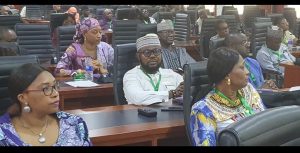
Participants’ Voices: From Enlightenment to Action
In the aftermath of a transformative training course on strategic foresight in defence and security management, participants spoke with resounding praise for the depth and relevance of the programme. Chief Executive Officer of CANAG Communications and Convener of the Geo-political series, Mr. Senator Iroegbu, described the training as a transformative experience directly addressing Nigeria’s longstanding challenges in policy planning and crisis response.
Reflecting on the course, Mr. Iroegbu noted that Nigeria’s poor policy implementation and reactive governance have often led to avoidable disasters, insecurity, and economic instability. Yet, in this initiative, he sees a timely and strategic solution to these entrenched issues. “The experience gained from this course has equipped me with essential knowledge and skills to anticipate and manage crises, enhancing my leadership capabilities and confidence in navigating complex situations,” he said. Completing the course, Mr. Iroegbu reiterated, has not only deepened his understanding of these crucial areas but also empowered him to apply these skills in real-world scenarios.
Mrs. Eniola Ekubi of the Defence and Police Officers’ Wives Association (DEPOWA) shared a similarly impactful experience. “The training was eye-opening. I had many ‘wao’ moments. I am taking back tools I can use during crises and everyday leadership,” she said. Speaking further, Mrs. Ekubi emphasised the critical need for public empathy towards security personnel. “Security personnel suffer trauma. Nigerians must stop making hurtful comments. Show empathy. We are all in this together.” She also underscored the importance of involving younger professionals in such training to enlighten and educate them on the necessities before they assume government positions, preparing them for the future.
Their voices convey a clear message of empowerment through knowledge and a call for greater understanding and collaboration in navigating Nigeria’s complex security landscape. Through enhanced leadership capabilities and empathetic public engagement, participants see pathways to more effective and resilient management of defence and security challenges.
Participants left the session with a renewed sense of urgency—to respond to crises and anticipate, prepare, and lead through them.
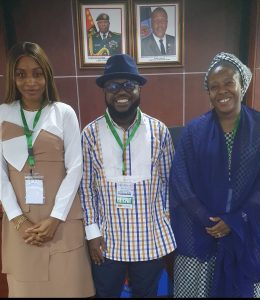
Key Takeaways and Recommendations
The NIPSS foresight training clearly demonstrates that Nigeria can shift from a reactive to a proactive national crisis management approach. The key takeaway is that foresight must become a core leadership competency—woven into policies, decision-making, and institutional frameworks. Leaders must embrace data-driven planning, collaborative governance, and scenario-based forecasting to stay ahead of emerging risks.
To move forward, it is recommended that Foresight units be established across MDAs to support anticipatory planning and policy design. Also, security and development frameworks should be integrated, recognising the root causes of insecurity and addressing them holistically. Media, youth, women, and civil society should be included in national foresight exercises to ensure inclusive and equitable solutions.
In addition, capacity-building on foresight tools should be scaled up across government tiers and regions. NIPSS should also institutionalise foresight as a recurring national leadership training program with tracking and implementation mechanisms.
Ultimately, Nigeria’s future depends on reacting better and thinking ahead together.

